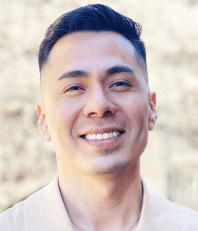
Jorge Sánchez Cruz
Assistant Professor, Department of Literature

- Q&A
- Biography
Q&A
What excites you most about joining our School of Arts and Humanities community?
“I am excited to join the community of the School of Arts and Humanities as it is a center of transborder and hemispheric conversations regarding migration, ethnic studies, Indigenous studies, gender studies and literatures and cultures of the world.”
Why did you choose your field? Why should students consider studying the arts and humanities?
“As a former business major in undergrad, I feel like the field of arts and the humanities chose me as I had no intention of following this line of career. Now, I see that historically the humanities have engaged with the complexities of world-making narratives, for instance how racial science and psychiatry conditioned (and still shape) Black, Indigenous, queer and trans* populations. In general, students should consider the arts and the humanities as it is not too separated from the hard and social sciences. In fact, my research probes on how different disciplines—like medicine, psychiatry, history, and cultural studies—contaminate each other.”
What research or project are you working on currently?
“I am currently finishing three projects. A co-edited book on queer theory in Mexico, forthcoming this fall 2024; a translation of Néstor Perlongher’s “The Specter of AIDS” (1988) also forthcoming; and a chapter on queer negativity in 1930s Mexico.”
What’s your favorite class to teach and why?
“I don’t really have a favorite class to teach as each course atmosphere and feeling changes every time. I do however enjoy teaching materials that heighten minority subjects as theory-makers and knowledge producers. For example, I have taught ‘Decolonial Views, Decolonial Practices: Indigeneity and Protest in Latin America and the Caribbean’ that situates how Native and Black populations attempt to make the colonial enterprise inoperative, so keep an eye for it!”
What is something about yourself that is not typically included in your bio?
“I am a Native of the Central Valleys of Oaxaca (Mixtec/Zapotec territories) and was undocumented for 23 years. As such, I am committed to fostering programs and initiatives that support the growth of underrepresented populations.”
Biography
Jorge Sánchez Cruz is a Native of the Central Valleys (Mixtec/Zapotec) of Oaxaca and a scholar of 19th to 21st century Latin American literature, culture and thought, with an emphasis on Mexico. Their research shows how aesthetic creations by Indigenous, Queer, trans* and undocumented subjects reflect and are grounded in the racial and gendered paradigms shaped by the afterlives of slavery and colonization. Gender and sexuality studies, continental philosophy, Indigenous studies, queer theory, and decolonial thought contour their pedagogy and research inquiries.
Their current manuscript, “Aesthetics of Repair: AIDS, Race, and Sexual Politics in the Americas,” explores literature and visual culture in 1980s and 1990s Mexico and Chile. This book is embedded in the so-called “reparative turn.” It probes that if the AIDS pandemic has been seen through loss, death and disappearance, it too can be reimagined through affirmative worldly inhabitations—like joy, intimacy and community praxes—enacted by racialized sexual dissidents as enduring strategies in sight of catastrophe.
Sánchez Cruz is also working on a project that investigates the re-actualization of colonialism and coloniality in the Mexican South, specifically in the Coastal Region of Oaxaca. Developments of this project have appeared in Revista: Harvard’s Review of Latin America.
Their work has appeared and is forthcoming in Social Text, TSQ: Transgender Studies Quarterly, the Journal of Latin American Cultural Studies, La Ventana: Revista de Estudios de Género, Harvard’s Review of Latin America, Mester, among other venues. They are the co-editor of the forthcoming book “Teoría Queer/Cuir en México” (Editorial Signos).
Sánchez Cruz’s research and teaching have been funded by the Andrew W. Mellon Foundation, the American Council of Learned Societies (ACLS), the University of Pennsylvania’s Center for Research in Feminist, Queer, and Transgender Studies, The David Rockefeller Center for Latin American Studies, and twice by Harvard University’s Provostial Fund for the Arts and the Humanities.
Before arriving at UC San Diego, they held academic appointments at Harvard University, the University of Pennsylvania and Northwestern University.
